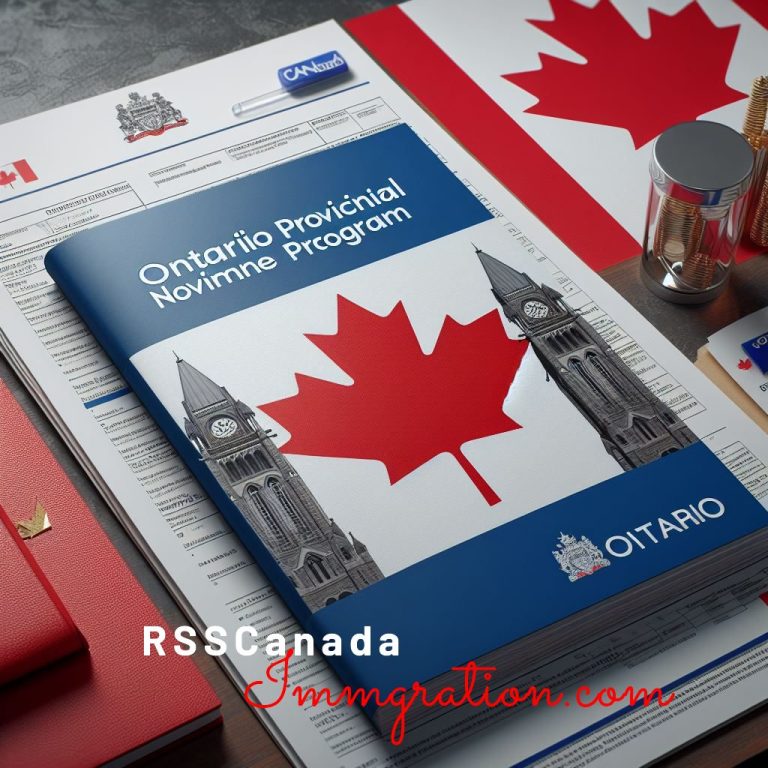What is the Canadian Comprehensive Ranking Score (Immigration Score) and How is it Calculated?
Canada Comprehensive Ranking Score (Immigration Score), also known as Canada Express Entry Score; is a scoring system that measures the qualification level of the person who will apply to the relevant institutions in order to settle in Canada with immigration status, according to the score received based on the Canada PR Score Calculator or the Canada Comprehensive Ranking System (CRS).
Here’s how the Canadian comprehensive ranking score (Immigration Score) is calculated.
- A person who wants to calculate his/her Canadian comprehensive ranking score (Immigration Score) must go to the Canadian Immigration Website (canada.ca) and enter the “Immigration and Citizenship” main heading.
- To calculate the Canadian comprehensive ranking score (Immigration Score), the person must access the “Immigration” subheading under the Immigration and Citizenship main heading.
- To calculate the Canadian comprehensive ranking score (Immigration Score), the person must access the “Express Entry” subheading under the Immigration main heading.
- To calculate your Canada comprehensive ranking score (Immigration Score), you must access the subheading “How does Express Entry work?” under the main heading Express Entry.
- To calculate your Canadian comprehensive ranking score (Immigration Score), you must access the “Check your score” option under the “Submit Your Profile” heading, shown as step 3 on the “How does Express Entry work?” page.
- A person who wants to calculate their Canadian comprehensive ranking score (Immigration Score) can calculate their Canadian comprehensive ranking score by answering the questions correctly and completely on the page directed to the “Check your score” option.
What is the Canadian Immigration Score?
The Canadian immigration score is a scoring system that measures how qualified a person is within the scope of the Canadian Skilled Worker Point System, who applies to the relevant institutions in order to settle in Canada with immigration status.
What is the Canadian Immigration Test?
The Canadian immigration test is a written or oral test, depending on the applicant’s situation, prepared by Immigration, Refugees and Citizenship Canada (IRCC) that tests whether the person who will settle in Canada with immigrant status has the qualifications to immigrate to Canada.
What is the Required Score for Canadian Immigration?
There is no lower limit for Canadian immigration scores. The maximum Canadian immigration score is 1200, and immigrant candidates are selected by ranking them from those with high scores to those with low scores. The average immigration score in 2020 – 2021 is 398.
What is the Canada Express Entry Score?
With the Canada Express Entry Program, a person who wants to settle in Canada and live permanently can have a maximum of 1200 points, but there is no lower limit. Canada Express Entry Program candidates are ranked from the highest to the lowest scores, and the most suitable candidates are selected.
The Canadian Express Entry Program is a program created by the Government of Canada where people apply to Canadian authorities for work and immigration based on their skills and qualifications through an online system. Applications for the Canadian Express Entry Program are made online through the Government of Canada website.
Why are Canadian Immigration Points Applied?
The Canadian immigration score is used to rank and select individuals eligible to immigrate to Canada under three federal economic immigration programs.
What are the Eligibility Requirements for Canada Immigration Score Calculation?
The work (study) programs that must be eligible in order to calculate the Canadian immigration score are explained below.
The Canadian Federal Skilled Worker Program is one of Canada’s primary settlement options for professionals and skilled workers who come to Canada from abroad to work and settle. The Canadian Federal Skilled Worker Program allows the Canadian Government to host tens of thousands of workers within Canada’s borders each year, depending on their talents in the workforce. Candidates who want to settle in Canada with immigration status and gain the right to work can apply to the Canadian Federal Skilled Worker Program with their spouses/partners and dependent children.
The Canadian Federal Skilled Trades Program was implemented by the Canadian Government due to the awareness of the labor shortage in skilled trades throughout Canada. With the Canadian Federal Skilled Trades Program, qualified and experienced tradesmen and skilled tradesmen from around the world can immigrate to Canada permanently.
Part of Canada’s Express Entry immigration system, the Canadian Experience Class (CEC) is a type of immigration program that allows people who have worked in Canada for at least one year to immigrate to Canada permanently.
How is Canada Immigration Score Calculated?
How the Canadian immigration score of a person who will apply to the relevant institutions to settle in Canada with immigration status is calculated is explained below.
- Scoring thresholds for Canadian immigration applicants without a spouse or partner are provided below .
- Up to 500 points for basic human capital factors,
- Up to 100 points for current skill transferability factors,
- 600 points for provincial candidacy,
- Up to 200 points for a qualified arranged employment offer,
- Up to 30 points for Canadian educational experience,
- Up to 50 additional points for French language ability along with English language ability,
- In Canada, a maximum of 15 points can be obtained for a sibling.
- Scoring thresholds for Canadian immigration applicants with a spouse or common-law partner are provided below.
- Up to 460 points for the principal Canadian immigration applicant’s core human capital factors,
- Up to 40 points for basic human capital factors of the spouse or common-law partner ,
- 600 points for provincial candidacy,
- Up to 200 points for a qualified arranged employment offer,
- Up to 30 points for Canadian educational experience,
- Up to 50 additional points for French language ability combined with English language ability
- A maximum of 15 points can be obtained for a sibling in Canada. (A sibling of the main Canadian immigration applicant and the accompanying spouse/common-law partner are taken into account).
What are the factors that affect Canada immigration scores?
There are a number of factors that affect the Canadian immigration score of the person who will apply to the relevant institutions in order to settle in Canada with immigration status. The factors that affect the Canadian immigration score are listed below under 3 main headings.
Human factors affecting Canadian immigration scores are listed below.
- Age factor
- Education level factor
- Experience factor: The work experience of the candidate who will apply for Canadian immigration gives him extra Canadian immigration points (up to 15 points).
- Language skills factor
- Regular employment factor in Canada: Candidates who will apply for Canadian immigration can receive up to 10 Canadian immigration points if they receive a job offer from an employer in Canada for at least 1 year.
- Adaptability factor: Candidates who will apply for Canadian immigration are given a Canadian immigration score of up to 10 points based on their educational background in Canada, their profession and relatives in Canada (if any).
The combination factors that affect the Canadian immigration score are listed below.
- Education and Canadian work experience factor
- Education and language ability factor
- Language ability and non-Canadian work experience factor
- Canadian and non-Canadian work experience factor
- Trade and Language aptitude qualification certificate factor
Human Factors Affecting Canada Immigration Score
Human factors affecting Canadian immigration scores are given below.
- Age factor
- Education level factor
- Experience factor: The work experience of the candidate who will apply for Canadian immigration gives him extra Canadian immigration points (up to 15 points).
- Language skills factor
- Canadian work experience factor: Candidates who will apply for Canadian immigration can receive up to 10 Canadian immigration points if they receive a job offer of at least 1 year from an employer in Canada.
- Adaptability factor: Candidates who will apply for Canadian immigration are given a Canadian immigration score of up to 10 points based on their educational background in Canada, their profession and relatives in Canada (if any).
Age Factor
Candidates who will apply for Canadian immigration are given points according to their age and a maximum of 110 Canadian immigration points can be obtained from the age factor. If the candidate who will apply for Canadian immigration plans to immigrate with his/her spouse or partner, he/she can obtain up to 100 Canadian immigration points. (The age of the candidate who will apply for Canadian immigration is calculated from the day the application is received.)
The effect of age factor on Canadian immigration score is shown in the table below.
| Age (in years) | The only candidate | Being a spouse or partner |
|---|---|---|
| 18 years and under | 0 points | 0 points |
| 19 | 105 points | 95 points |
| 20-29 | 110 points | 100 points |
| 30 | 105 points | 95 points |
| 31 | 99 points | 90 points |
| 32 | 94 points | 85 points |
| 33 | 88 points | 80 points |
| 34 | 83 points | 75 points |
| 35 | 77 points | 70 points |
| 36 | 72 points | 65 points |
| 37 | 66 points | 60 points |
| 38 | 61 points | 55 points |
| 39 | 55 points | 50 points |
| 40 | 50 points | 45 points |
| 41 | 39 points | 35 points |
| 42 | 28 points | 25 points |
| 43 | 17 points | 15 points |
| 44 | 6 points | 5 points |
| 45 years and older | 0 points | 0 points |
Education Level Factor
Candidates who will apply for Canadian immigration can receive a maximum of 150 Canadian immigration points for their level of education. If the candidate who will apply for Canadian immigration has education abroad, he/she must obtain an ECA report from an authorized institution. The Educational Credential Assessment (ECA) report evaluates whether the candidate who will apply for Canadian immigration has degrees/diplomas abroad at the same level as the Canadian education.
The effect of the education level factor on the Canadian immigration score is given below.
| Level of Education | The only candidate | Being a spouse or partner |
|---|---|---|
| Less than a secondary education (high school) diploma | 0 points | 0 points |
| Secondary school diploma | 30 points | 28 points for partner, 2 points for spouse |
| One-year post-secondary program | 90 points | 84 points for partner, 6 points for spouse |
| Two-year post-secondary program | 98 points | 91 points for partner, 7 points for spouse |
| 3 or more years of post-secondary program | 120 points | 112 points for partner, 8 points for spouse |
| Two or more postsecondary programs, at least one of which was completed after a three- or more-year postsecondary program | 128 points | 119 points for partner, 9 points for spouse |
| Master’s degree or entry-to-practice professional degree | 135 points | 126 points for partner, 10 points for spouse |
| Doctor of Philosophy (PhD) | 150 points | 140 points for partner, 10 points for spouse |
First Language Ability (English or French) Factor
Candidates who will apply for Canadian immigration can receive a maximum of 136 Canadian immigration points by providing English and/or French language proficiency. The effect of the first language proficiency factor on the Canadian immigration score is given below.
| Canadian Language Benchmark (CLB) | Single Candidate | Being a spouse or partner |
|---|---|---|
| For every language ability | 34 points | 32 points for partner, 5 points for spouse |
| CLB 3 or lower | 0 points | 0 points |
| CLB 4 | 6 points | 6 points for partner, 0 points for spouse |
| CLB 5 | 6 points | 6 points for partner, 1 point for spouse |
| CLB 6 | 9 points | 8 points for partner, 1 point for spouse |
| CLB 7 | 17 points | 16 points for partner, 3 points for spouse |
| CLB 8 | 23 points | 22 points for partner, 3 points for spouse |
| CLB 9 | 31 points | 29 points for partner, 5 points for spouse |
| CLB 10 or higher | 34 points | 32 points for partner, 5 points for spouse |
Second Language Proficiency (English or French)
Candidates who will apply for Canadian immigration can receive 24 Canadian immigration points by providing proficiency in a second language (English or French). The effect of the second language proficiency factor on the Canadian immigration score is given below.
| Canadian Language Benchmark (CLB) | Single Candidate | Being a spouse or partner |
|---|---|---|
| For every language ability | 6 points | 6 points |
| CLB 4 or lower | 0 points | 0 points |
| CLB 5 or 6 | 1 point | 1 point |
| CLB 7 or 8 | 3 points | 3 points |
| CLB 9 or higher | 6 points | 6 points |
If the language proficiency of the candidates who will apply for Canadian immigration is not at a good level, applying to language schools is a good solution. Canadian language schools eliminate the deficiencies of the Canadian immigration candidate in this regard and prepare the person for the Canadian Language Benchmark (CLB) exam.
Canadian Work Experience Factor in Comprehensive Ranking System
In the comprehensive ranking system, the Canadian work experience factor gives the candidate who will apply for Canadian immigration extra Canadian immigration points (up to 100 points) for his/her work experience.
The impact of the Canadian work experience factor on the Canadian immigration score is given below.
| Number of Years of Work Experience | The only candidate | Being a spouse or partner |
|---|---|---|
| Less than 1 | 0 points | 0 points |
| 1 year | 40 points | 35 points for partner, 5 points for spouse |
| 2 years | 53 points | 46 points for partner, 7 points for spouse |
| 3 years | 64 points | 56 points for spouse, 8 points for partner |
| 4 years | 72 points | 63 points for partner, 9 points for spouse |
| More than 5 years | 80 points | 70 points for partner, 10 points for spouse |
Combination Factors Affecting Canada Immigration Score
The combination factors that affect the Canadian immigration score earn the applicant additional Canadian immigration points if he/she performs well in two areas. Up to 50 points can be earned for each combination of two factors, with an upper limit of 100 points.
Education and Canadian Work Experience Factor
The effect of the combination of educational background and work experience in Canada on the Canadian immigration scores of candidates who will apply for Canadian immigration is given below.
| Education Level | 1 year of Canadian Work Experience | 2 or more years of Canadian work experience |
|---|---|---|
| If no education has been received beyond high school | 0 points | 0 points |
| If you have received 1 year or more of post-secondary education | 13 points | 25 points |
| If two or more years of high school education have been received, the first of which lasted 3 or more years | 25 points | 50 points |
If the candidate who will apply for Canadian immigration does not have any work experience in Canada, it is necessary to apply for a Canadian work permit. A Canadian work permit allows the holder to work full-time in Canada.
Education and Language Ability Factor
The effect of the combination of the educational background and the first or second language factor of the candidates who will apply for Canadian immigration on the Canadian immigration scores is given below.
| Education Level | CLB 7 or above in all language skills with at least one of these CLB 8 | CLB 9 or above for all language skills |
|---|---|---|
| If no post-secondary education has been received | 0 points | 0 points |
| If you have received 1 year or more of post-secondary education | 13 points | 25 points |
| If two or more years of high school education have been received, the first of which lasted 3 or more years | 25 points | 50 points |
Language Ability and Work Experience Factor That Doesn’t Exist in Canada
The effect of the combination of the first or second language and non-Canadian work experience factor of the candidates who will apply for Canadian immigration on their Canadian immigration scores is given below.
| Work Experience Outside Canada | CLB 7 or above in all language skills with at least one of these CLB 8 | CLB 9 or above for all language skills |
|---|---|---|
| No work experience outside of Canada | 0 points | 0 points |
| Have 1 or 2 years of work experience outside of Canada | 13 points | 25 points |
| Have 3 or more years of work experience outside of Canada | 25 points | 50 points |
Canadian and Non-Canadian Work Experience Factor
The effect of the combination of Canadian and non-Canadian work experience factors on the Canadian immigration scores of candidates who will apply for Canadian immigration is given below.
| Work Experience | 1 year of Canadian work experience | 2 or more years of Canadian work experience |
|---|---|---|
| No work experience outside of Canada | 0 points | 0 points |
| Have 1 or 2 years of work experience outside of Canada | 13 points | 25 points |
| Have 3 or more years of work experience outside of Canada | 25 points | 50 points |
Proficiency Certificate Factor in Trade and Language Ability
The effect of the combination of trade proficiency and the first or second language factor on the Canadian immigration scores of the candidates who will apply for Canadian immigration is given below.
| Certificate of Proficiency | CLB 5 or above in all language skills with at least a CLB 5 or 6 | CLB 7 or above in all language skills |
|---|---|---|
| Certificate of competence in a trade profession issued by a province | 25 points | 50 points |
Additional Factors Affecting Canada Immigration Score
Additional factors affecting the Canadian immigration score of candidates who will apply for Canadian immigration are given below.
| Additional Factors | Point |
|---|---|
| State nomination obtained under an Express Entry compliant State Nomination Program (PNP) stream/category | 600 |
| Having received a qualified job offer in the Senior Management profession within Main Group 00 of the National Occupational Classification (NOC) | 200 |
| Have a qualified job offer in any skilled occupation (NOC 0, A or B level) | 50 |
| Have completed a one-year or two-year educational program in Canada | 15 |
| Have entered or completed a three-year/master’s degree to apply for a professional degree or Doctor of Philosophy (PhD) in Canada | 30 |
| Have language proficiency in French at CLB 7 or above and English at CLB 4 or below (or no English test result at all) | 25 |
| Have language proficiency in French CLB 7 or above and English CLB 5 or above | 50 |
| Having a sibling residing in Canada | 15 |
How to Increase Your Canadian Immigration Score?
How a candidate who will apply for Canadian immigration can increase his Canadian immigration score is explained below.
- Increasing the language score : If the candidate who will apply for Canadian immigration gets a good score from language exams such as TEC, IELTS, his/her Canadian immigration score will also increase. If the candidate who will apply for Canadian immigration gets a score of 9 from the Canadian Language Benchmark (CLB), 136 points will be added to the Canadian immigration score, it is possible to reach the desired level in the Canadian immigration score by increasing the score received in the language exam.
- Provincial nomination obtained through the provincial nominee program : If a candidate who will apply for Canadian immigration receives an invitation from a provincial nominee program that is compatible with Express Entry, he/she can receive 600 additional Canadian immigration points.
- Receiving a job offer [LMIA Approved] : If a candidate who will apply for Canadian immigration receives a job offer from a Canadian employer that is recognized by the Labour Market Impact Assessment (LMIA), he/she can earn 200 Canadian immigration points.
- Studying in Canada : Candidates applying for Canadian immigration can receive up to 30 extra Canadian immigration points if they complete a degree recognized in Canada.
- External persons included in the application [Spouse/Legal Partner] : If a candidate who will apply for Canadian immigration applies with his/her spouse, both persons will earn additional Canadian immigration points. While the language proficiency of the spouse of the candidate who will apply for Canadian immigration is worth 20 Canadian immigration points, he/she can earn 10 Canadian immigration points for each category in the education level and Canadian work experience categories.
- Having work experience in Canada : If the candidate who will apply for Canadian immigration has less than three years of full-time work experience in Canada and continues to work, he can earn 150 Canadian immigration points.



